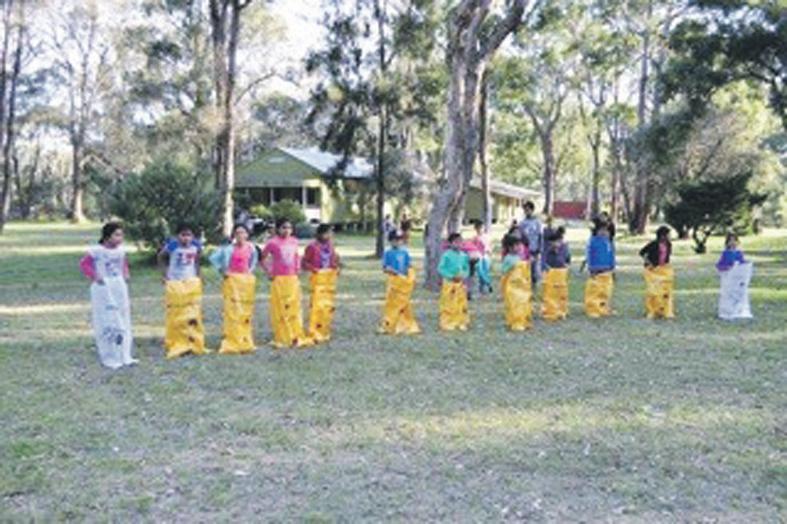
15 minute read
Fun domestic debate at SSS
from 2013-10 Sydney (1)
by Indian Link
September 22 was a special day for students of the Sydney Sanskrit School (SSS) as they gathered together with family, friends, instructors and volunteers to enjoy a valedictory ceremony marking the conclusion of the School’s three-day camp. 40 children aged from 5 to 16 attended the ‘Sanskrit for Fun’ camp, which indeed proved to be an enjoyable experience, as the children experienced a varied and well-presented agenda from Sanskrit recitation sessions to yoga, singing, arts and craft, and special break-away groups on communication for the older children. An Aboriginal couple who were invited to present their views on sustainability and the environment, among other programs, were very well received by the eager attendees through the duration of the camp.
The event began with a prayer, followed by Dr Meenakshi Srinivasan, Director of the Sanskrit School who took to the dais to thank all for attending. She then proceeded to launch Time to Reflect, a book of short essays by Dr Saroja Srinivasan, an established clinical psychologist and well-respected member of the Indian community here in Australia. Dr Meenakshi read out a couplet that she had composed specifically for the book, and then invited Raghavan Srinivasan, Dr Saroja’s husband to launch the book. He read a few lines from the author’s note on the concept of the book. He then presented the first copy to Dr Meenakshi and Dr Lakshmi Sathyanarayana, President of the School of Vedic Sciences. Dr Saroja read a couple of poems from the book which were well received by the audience.
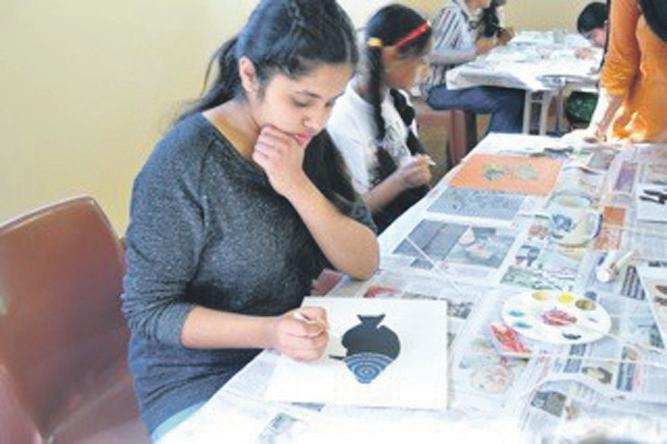
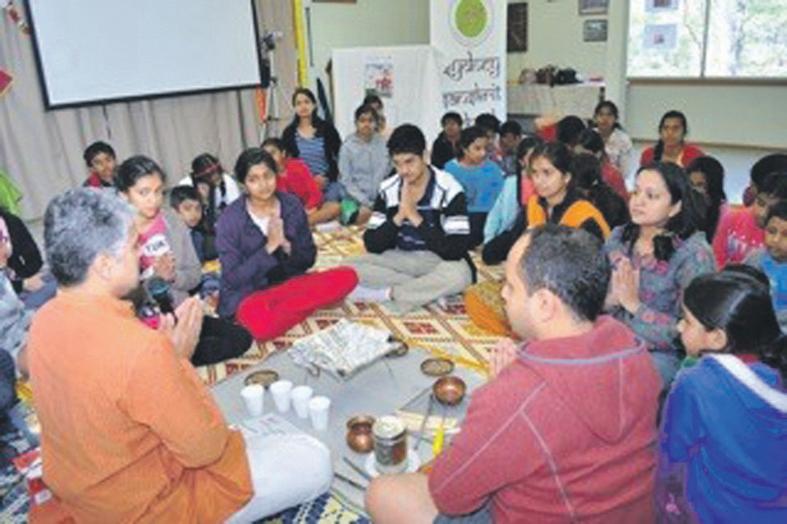
“By no means is this collection of essays meant as a treatise on life, just some thoughts and reflections on various topics,” stated Dr Saroja in the author’s note. “Over the years, I have had the good fortune to hear from many wise people, read some wonderful books and hopefully synthesize it all into a philosophy for living”. This is a philosophy heartily endorsed by her in word and deed, as attested by the Indian community which is often a recipient of her kindness and generosity. The concept of consolidating Dr Saroja’s thoughts into a book developed into a reality following almost three years of writing a regular column in Indian Link, which was well received by the community. It is these gleanings from a reflective life that have been collated into the book, experiences that have made an impression on Dr Saroja through her personal life and career. Published under the auspices of the School of Vedic Sciences Inc., proceeds from the sale of 20 books donated by the author will be presented to the organisation. Several people attending the event avidly enquired about the book; unfortunately limited copies were available on the day, but more copies will be available soon.
Following the book launch, the event continued with songs by volunteers, and the highlight of the evening, a debate between children and their parents on the enlightening topic of ‘It’s okay to be cool!’ This concluding event was conducted in an admirable spirit of camaraderie and proved to be quite an eye-opener for parents and their children as concepts of what constitutes as ‘cool’ were diverse and highly entertaining.



The event concluded with afternoon tea and thanks to all the attendees, volunteers, participants, facilitators and parents who joined together to make the valedictory ceremony a grand success.
SBX BUSINESS BROKERS are one of the largest Business Brokers in Australia servicing Sydney, Melbourne, Brisbane and the Gold Coast. With over 28 years of experience, you can be assured that SBX Business Brokers can assist you in either selling or buying a business, Simply register online. Below is a list several businesses which are currently for sale. To find out more about these businesses or check out over 1000 other businesses we have for sale please log on to WWW.SBX.COM.AU or contact me CK on ck@sbx.com.au
/0432330910
Eastern Suburbs, T/o $16,000, Nets $1990, Asking $100,000- M1633
North Sydney, T/o 23,000, Nets $8160, Asking $1.1 MIL – M1634
Bankstown area, Franchise, T/o $100,000, Nets $10,000, Asking $990,000-U1205
Parramatta area, T/o $25,000, Nets $4022, Asking $350,000 -M1609
Inner west Convenience store, T/o $10,500, Nets $1857, Asking $84,500 – GT1099
Carlingford area, Convenience Store T/o $8,800, Nets $2346, Asking $249,000 – GT1113
BusiNesses FOR saLe
North shore, Post office + Newsagency, T/o $35,100 , Nets $4,700, Asking
$580,000 –SM1336
North Sydney area, Post Office + Newsagency ,$42,550, Nets
$4300, Asking $650,000-M1457
Parramatta area, News agency, T/o $57,600, Nets $3899, Asking
$550,000 –SC1009
Innerwest, Newsagency, T/o
$58,888, Nets $4100, Asking
$395,00 –SM1287


Eastern Suburbs, Franchise, T/o $46,000, Nets $3,600 , Asking $329,000- T2754
Wollongong area, Franchise, T/o $75,500, NETS $2219, Asking $160,000 –GT1067 Wollongong area, Franchise, T/o$127,000, Nets $5560, Asking $499,000 –SR1047
Central Coast, Franchise, T/o $26,178, Nets $3000, Asking $379,000 –F2627
Inner west, Indian, T/o $8200, Nets $2230, Asking $159,000 –SC1004
City area, Indian, T/0 $20,000, Nets $3500, Asking $390,000 – SD1061 St Ives area, Café, T/o12,000, Nets $3000, Asking $150,000- M1585
North Ryde, Cafe, T/o 35,000, NETS $3,000, Asking $390,000 –T2622 Chatswood area, Franchise Cafe, T/o 20,000, Nets $2700 – FL1155
Canterbury area, Fast food franchise, T/o $17,000, Nets $2500 , Asking $255,000-W1405
Manmohan, Sharif break ice, but stick to their stands
In a tentative opening of doors, Prime Minister Manmohan Singh and his Pakistani counterpart, Nawaz Sharif held talks in New York recently to improve their relations. But India made it clear that peace along the LoC was a must for a full dialogue and bringing masterminds of 2008 Mumbai terror attack was vital.
Addressing media after the ice-breaking “useful and friendly” talks in New York recently on the sidelines of the UN general assembly, Indian National Security Advisor Shivshankar Menon said Manmohan Singh told Sharif that it was vital to bring to book those in Pakistan who masterminded the Mumbai terror attack that killed 166 people including many foreigners.
“Both sides wish to see a better IndiaPakistan relationship. Both sides want a much better relationship,” Menon told media.
“In order to get there, we need to address today the issues we face,” he added, which he said included restoring “peace and tranquillity” along the LoC and addressing issues related to terrorism.
“It is very important to address the terrorism issue,” Menon underlined, making it clear that while there was no proof of India interfering in the internal affairs of Pakistan, the reverse was not true.
At a separate briefing for the media, Pakistan Foreign Secretary Jalil Abbas Jilani termed the talks “positive and constructive,” but took the line that a “peaceful sustained and uninterrupted dialogue” was the way to resolve issues between them.
“There is no alternative to a peaceful sustained and uninterrupted dialogue. We need to have an interaction on a regular basis to address all our outstanding issues,” he said.
The two prime ministers tasked the Director Generals of Military Operations (DGMOs) of both countries to come up with “effective measures” to restore the 2003 ceasefire on the Jammu and Kashmir border, the Indian national security advisor told media.
“The decision was for DGMOs to come up with real plans to restore the ceasefire”.
Menon said Sharif raised issues of concern to Pakistan including the disputed
Siachen glacier and Sir Creek.
“Our overall impression was that the meeting was useful, it provided an opportunity to discuss issues that are troubling the relationship,” he added.
Sharif invited the Indian Prime Minister to visit Pakistan, and Manmohan Singh, who was born in what is now the Pakistani Punjab, reciprocated. No dates have been set for their visits.
Menon acknowledged that while the two leaders desire a better bilateral relationship, they were “also conscious of the difficulties standing in the way”.
On the issue of terrorism, saying that it affected them both Jilani made no promises and instead harped on Kashmir and spoke of “external interference” without naming India.
“Terrorism was discussed. We are aware of your concerns on terrorism, and I think our concerns are also known to the Indian side,” he said in response to a question from Indian media.
Asked about Manmohan Singh’s description of Pakistan as the “epicentre of terrorism” Jilani said, “It was not raised during the meeting. Terrorism was discussed but not in the context that you are talking about”.
“Prime Minister Sharif also emphasised on external interference in Balochistan and other parts of Pakistan,” Jilani said.
Describing Kashmir as a “very important issue” that needs to be resolved, Jilani said, “We witnessed an equal willingness on the part of the two leaderships to discuss things in an amicable manner”.
Responding to questions on Mumbai attack mastermind Hafeez Saeed and his organisation Jamaat-ud-Dawa (JuD), Jilani parried saying there is “willingness and commitment” on the part of both sides to discuss the issue of terrorism.
The schools and other educational institutions being run by JuD have now been taken over by provincial government of Pakistan at the direction of Islamabad in compliance with the UN Security Council resolution in this regard.
Jilani also claimed that the monitoring team of the UN which had recently visited the country in its report had found nothing about Pakistan violating the UN Security Council resolution in this regard.
Report says heart disease kills 17.3 million each year
Cardiovascular diseases (CVDs), including heart disease and stroke, cause 17.3 million deaths each year worldwide, and by 2030 it is expected that 23 million people will die from CVDs annually, a report released recently in New Delhi said.
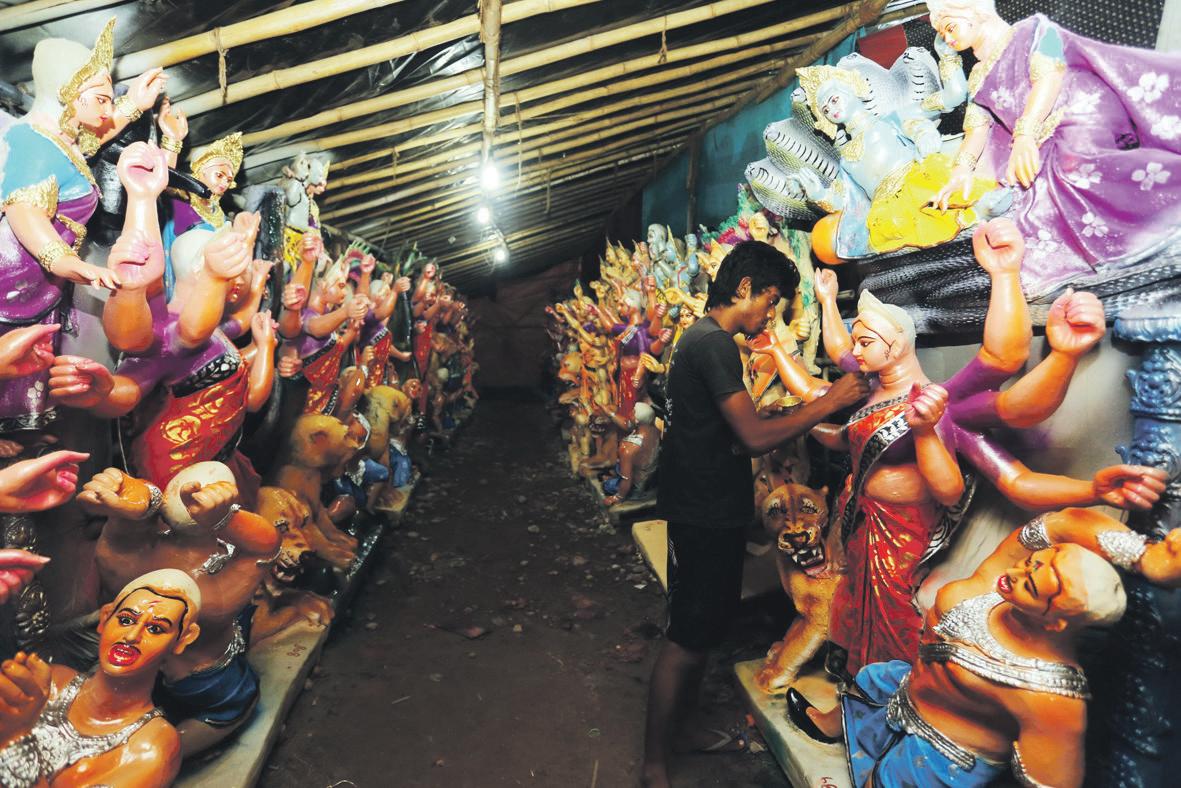
September 29 was observed as World Heart Day. Every year since 2000, September 29 has been observed by the World Heart Federation as World Heart Day to spread awareness about the rising instance of heart disease.
“Cardiovascular diseases (CVDs), including heart disease and stroke, take lives prematurely,” said Rishi Sethi, associate professor, Department of Cardiology, King George’s Medical University, Lucknow. “In fact, they cause 17.3 million deaths each year and the numbers are rising. By 2030, it is expected that 23 million people will die from CVDs annually”.
The intervention cardiology data compiled by Rishi Sethi revealed that over 4,500 lifesaving angioplasty procedures and almost 2,000 lifesaving pacemaker implantations have been performed in 2011-2012 in the state of Uttar Pradesh. The number of these procedures has increased by almost 30 percent over the last year, he said.
“Children are vulnerable too, the risk for CVDs can begin before birth, during foetal development, and increase further during childhood with exposure to unhealthy diet, lack of exercise and smoking,” the doctor said.
The doctor also underlined how simple lifestyle changes like giving up tobacco could make a big difference to cardiovascular health.
“The tobacco industry interference in public health policy has been recognised as the biggest obstacle in enforcing tobacco control laws. Strengthening tobacco control is one of the evidence-based ways to reduce CVDs,” said Ehsaan Latif, director, Tobacco Control, at the International Union against Tuberculosis and Lung Disease.
It is an international voluntary scientific organisation working in low and middle income countries to fight HIV/AIDS, TB, lung disease, tobacco-related morbidity and non-communicable diseases.
India, Canada n-agreement comes into force
Canada has announced the coming into force of a Nuclear Cooperation Agreement with India.
This was announced by Canada’s Minister of Natural Resources Joe Oliver and Lynne Yelich, minister of state (Foreign Affairs and Consular) in the Canadian capital.
“This coming into force results from Canada’s vigorous efforts to reach new markets for energy exports, creating opportunities for Canadian business. The Canadian nuclear industry currently supports 30,000 direct jobs across our country,” said a statement issued by the Canadian High Commission in New Delhi recently.
Oliver said, “This milestone represents a significant step in diversifying markets for our energy exports, thereby creating jobs and solidifying Canada’s long-term prosperity”.
“The agreement with India will permit Canadian companies to reach an important new market for Canadian uranium, nuclear technology, services and equipment,” he said.
Oliver had met External Affairs Minister Salman Khurshid September 23 in Ottawa. He visited India in October 2012 to promote Canadian exports to India, the fourth-largest energy consumer in the world. India is expected to more than triple its electricity supply within the next 25 years, the statement said.
Oliver had earlier announced that the Appropriate Arrangement Agreement pursuant to the Canada-India Nuclear Cooperation Agreement had been signed by both countries in Saskatoon April 8, 2013.
“I am very pleased that this crucial agreement is now in force,” said Yelich. “It is important for the province of Saskatchewan, one of the world’s largest producers of uranium, and can only solidify Canada’s already strong relationship with India”.
“The Nuclear Cooperation Agreement and the supporting Appropriate Arrangement will allow Canadian companies to export nuclear items for peaceful uses, in accordance with Canada’s nuclear nonproliferation policy. The Canadian Nuclear Safety Commission, Canada’s independent nuclear regulator, will be responsible for implementation, ensuring that Canadian exports only go to facilities in India under International Atomic Energy Agency safeguards,” the statement said.
“With the coming into force of this Nuclear Cooperation Agreement, the Canadian government reaffirms its commitment to support and grow Canada’s nuclear industry, which generates about $5 billion in electricity annually and approximately $1 billion a year in uranium exports,” the statement said.
India and Canada had signed a civil nuclear cooperation agreement in 2010.
Indian-American becomes top US judge, creates history
With his hand on the Gita and watched by family friend Gursharan Kaur, Indian Prime Minister Manmohan Singh’s wife, Chandigarh-born legal luminary Sri Srinivasan made history as he became the first Indian American to be sworn in as a judge of what is often called the second most powerful court in the US.
Srinivasan, 46, was sworn in an overflowing court room by retired Supreme Court judge Sandra Day O’Connor, in the presence of legal luminaries, friends and families as his mother Saroja Srinivasan held the Gita, the sacred book of Hinduism, before him.
Gursharan Kaur literally rushed from the airport with just a short halt at the hotel to watch the investiture of Srinivasan on the bench of the US Courts of Appeal for the District of Columbia Circuit.
O’Connor, for whom Srinivasan once clerked, called him “fair, faultless and fabulous”.
Confirmed by the US Senate in May by a 97 to 0 vote, Srinivasan was earlier principal deputy solicitor general of the US to which job he succeeded another Indian American, Neal Kumar Katyal, in August last year.
Srinivasan came to the US with his parents in the 1970s at the age of four. His family settled in Lawrence, Kansas, where his father was a mathematics professor at the University of Kansas, and his mother taught at the Kansas City Art Institute.
He received his BA with honours and distinction in 1989 from Stanford University and his JD with distinction in 1995 from Stanford Law School, where he was elected to Order of the Coif and served as an editor of the Stanford Law Review.
Yamuna’s plight highlighted on World Rivers Day
Green activists recently walked along the Yamuna to the Taj Corridor to highlight the plight of the river burdened by human waste and industrial pollutants.
The ‘Walk for Yamuna’ was undertaken on World Rivers Day, to draw attention to rivers facing severe and increasing threats associated with climate change, pollution and industrial development.
The Yamuna in Agra is now seen posing a major threat to the historical monuments along its banks including the 17th century Taj Mahal, whose foundation needs constant moisture.
“But in the past two decades, all kinds of pollutants and toxics are freely flowing into the river,” said an organiser of the walk, Shravan Kumar Singh. These could corrode the structure below the main platform of the Taj, he said.
Jugal Kishore Shrotriya, a temple priest and a young green activist, said that the Yamuna, for all practical purposes, was dead in Agra.
“Only garbage, carcasses and sewer flow,” he said. “The aquatic life has been decimated. So many plans and schemes to save the river have gone down the drain”.
Activists said the free flow of the river has been obstructed by a series of barrages upstream that hold up all the water. What reaches Agra is just waste and sewage.
“The Yamuna Action Plans have made no discernible improvements in water quality. The flow is inadequate. The sewage treatment plants either do not work or are short of resources,” said Surendra Sharma of Heritage Society.
Pre-conception sex selection rising: Lawyer
Sex selection of a baby at the pre-conception stage is on the rise, and now a Rs.15 crore business, a lawyer said in New Delhi recently, while addressing a symposium on the challenges in the implementation of the law on the issue.
“The sex determination of a foetus preconception in the laboratory is on the rise in our country, and has emerged as a lucrative Rs.15 crore business,” said advocate Varsha Deshpande, speaking at a symposium in the national capital that deliberated on the implementation of the Pre-Conception and
Pre-Natal Diagonistic Technique Act (PC PNDT), 1994.
“Sex determination before the preconception stage through selection of chromosomes is not strictly prohibited under the PC PNDT Act,” Deshpande explained, adding that procedures exist by which parents opting for in-vitro fertilization procedures might select the sex of the unborn baby without breaking the law of 1994.
The PC PNDT Act prohibits sex selection, before or after conception and provides for regulation of prenatal diagnostic techniques for the purpose of detecting disorders and the prevention of their misuse for sex determination, leading to female foeticide.
Asha Menon, member-secretary, National Legal Services Authority (NALSA) said, “It is important to check now, as the in-vitro fertilisation unit has resulted in the highest number of male births”.
As per the 2011 census, Delhi recorded a low child sex ratio of 866 girls to 1,000 boys.
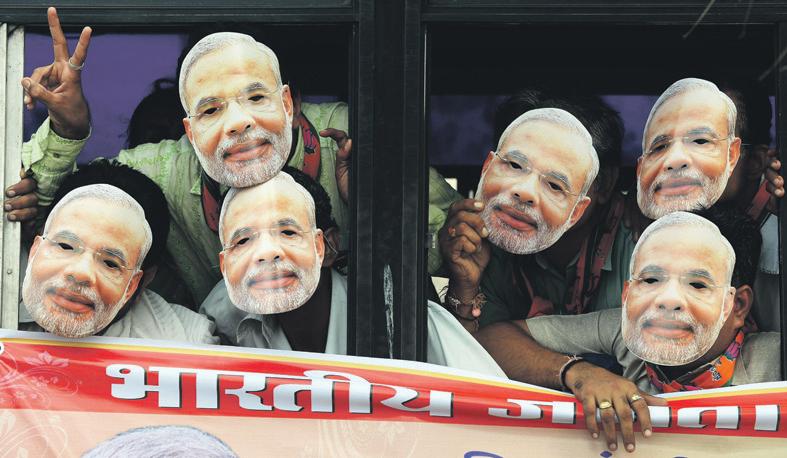
The act of 1994 was introduced after ultrasound techniques began to be used in the 1990s to determine the sex of the foetus. The number of female foeticides rose as a result of the technique, and the sex ratio (number of girls for every 1,000 boys) showed sharp decline.
“The situation is becoming extremely serious, with some sections of the media reporting a child sex ratio of 789 girls per 1,000 boys in the last quarter. Hence there is an urgent need for a consolidated effort from the law enforcement agencies and civil society organisations to address this issue at the earliest,” Ranjana Kumari, director, Centre for Social Research, said.
Vipassana pioneer S.N. Goenka dead
Spiritualist and pioneer of the Vipassana meditation in India, S.N. Goenka, 90, died on the night of September 29 at his residence in Mumbai due to old age, said aide Gautam Gaikwad in Mumbai.
He is survived by his wife Mata Elaichidevi and six sons.
The funeral was held in Jogeshwari electric crematorium.
Goenka started teaching Vipassana meditation in 1969 and followed it up with a meditation centre in Igatpuri, near Nashik, in 1976.
Last year, Goenka was conferred the Padma Bhushan, India’s third highest civilian award.
Born and raised in Burma, Goenka was a successful businessman when he came in contact with the late Sayagyi U Ba Khin, who taught him the Vipassana techniques.
After 14 years training under Sayagyi, Goenka decided to settle in India and started teaching Vipassana meditation in 1969.
He established the Vipassana International Academy, a meditation centre in Igatpuri in 1976.
Later, 172 more such centres blossomed worldwide, including 75 in India.
In 1982, he became a vipassanacharya and started training teachers worldwide and established the Vipassana Research Institute in Igatpuri in 1985.
Goenka’s technique represented a tradition that can be traced back to Lord Gautam Buddha who taught ‘Dhamma’ as the nonsectarian way to liberation.
Goenka’s approach was also totally non-sectarian and found universal appeal, including among jail inmates in India and US.
In 2000, Goenka addressed the Millennium World Peace Summit at the UN headquarters in New York.
Following his passion, he laid the foundation of the Global Vipassana Pagoda at Gorai Beach, in north-west Mumbai.
Standing at 325 feet (or the height of a 30-storeyed building), it encompasses the world’s largest pillar-less stone dome, twice as big as the Basilica of St. Peter at the Vatican City.
In the centre is a circular meditation hall, 280 feet in diameter with a seating capacity of 8,000, and relics of Buddha are kept in the pagoda.
Goenka believed that the monument would bridge different communities, sects, races and countries to make the world a more harmonious and peaceful place.
Yuvraj returns for Australia series
Rewarded for his recent good form, all- rounder Yuvraj Singh was recently recalled in the Indian team for the first three One-day Internationals of a seven-match series and a one-off Twenty20 against the touring Australia.
The selection committee of the Board of Control for Cricket in India (BCCI) announced the 15-man squad for the series in Chennai, making four changes in the squad that won the Champions Trophy in June.
Yuvraj, Ambati Rayudu, Mohammed Shami and Jaydev Unadkat have been picked in place of Murali Vijay, Dinesh Karthik, Irfan Pathan and Umesh Yadav.
Other seniors like Virender Sehwag, Gautam Gambhir and Harbhajan Singh will have to wait for their return to the national fold.
Yuvraj comes to the side after scores of 84, 52, 61, 40 and 123 in the series against West Indies A and Challenger Trophy. His last international match was an ODI against England in Dharamsala in January.
Fast bowlers Shami and Unadkat have been rewarded for their impressive show in the five-match series in Zimbabwe.
The axe for speedster Yadav is surprising though he proved expensive in the Challenger Trophy. Wicket-keeper Karthik was overlooked against Rayudu, who averaged more than 50 runs in Zimbabwe. Opener Vijay could not retain his place while Irfan Pathan is injured.
Off-spinner Ravichandran Ashwin replaces Parvez Rasool, who misses out after the Zimbabwe stint alongside Cheteshwar Pujara, Mohit Kumar and Ajinkya Rahane.
India will play a T20 and seven ODIs against Australia but selectors decided to pick the squad only for the initial three games.
The T20 will be played in Rajkot, October 10. The first three ODIs will be hosted in Pune (October 13), Jaipur (October 16), and Mohali (October 19).
India squad: Mahendra Singh Dhoni (captain), Shikhar Dhawan, Rohit Sharma, Virat Kohli, Yuvraj Singh, Suresh Raina, Ravindra Jadeja, Ravichandran Ashwin, Bhuvneshwar Kumar, Ishant Sharma, Vinay Kumar, Amit Mishra, Ambati Rayudu, Mohammed Shami, Jaydev Unadkat.
IANS










